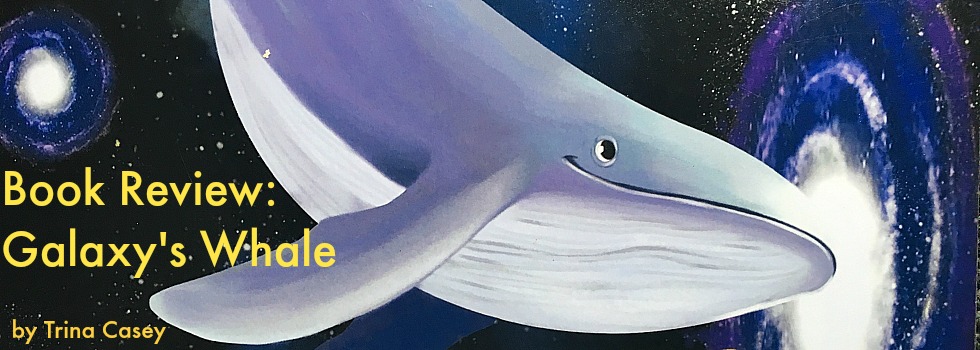A rebellious and dissatisfied princess meets a unicorn and journeys to another world in the mouth of a whale (!) on a magical journey of healing and self-discovery? It may sound like pure fantasy, but Galaxy’s Whale is all about kids in this real world!
Courage is the most important of all virtues, because without courage, you cannot practice any of the other virtues consistently.
~ Maya Angelou.
This is the quote with which author Trina Casey chooses to frame her story of the young Princess Safiya because Galaxy’s Whale is, indeed, a story all about courage. Not the usual kind of courage needed in fairy stories – there are no dragons or evil witches lying in wait for our princess. Here the battles are internal and the courage needed is the courage to be yourself. It’s an unconventional children’s book that can be read and appreciated on many levels. It can be read as a straightforward fantasy/adventure story with some refreshingly new kinds of characters (magical whales don’t show up much any more in literature!). It can be read as a psychological journey, with our young heroine having to leave home so she can see it, and herself, more truthfully. It can also be read as a journey of empathy into the experiences of others as Princess Safiya learns much more about the people who live in her real world. How you read Galaxy’s Whale is up to you, but there is a Parent’s Notes section with a helpful guide to facilitate discussions about the characters and themes of the book.
Meet the Author
Casey’s intention with this book, and with others to follow, is to create dialogue around real life issues in the world and help children learn to navigate these challenges with courage and empathy. A teacher, writer, and entrepreneur who has lived and worked on three continents, Casey is originally from California, but now calls Amsterdam home. Observing that she found herself making up stories to tell her young son at bedtime because she couldn’t find books that addressed real issues he was encountering in and out of school, Casey decided to create her own publishing company, This Real Life Books, which would focus on the genuine emotional experiences of children. She says, “Childhood trauma tends to get ignored, and if we as parents don’t address it, we send them out into the world not knowing what’s real.” In addition to writing, Casey also teaches an after-school course, Mindful Storytellers, at the De Nieuwe Internationale School van Esprit (DENISE).
Open the Book
So what is Galaxy’s Whale about? It’s a story of personal transformation and how it can trigger group transformations. Young princess Safiya is feeling frustrated: with the rigidity of the expectations placed on her as a princess; with the isolation of being born between nearly adult siblings and a much younger (half) brother; with the uncertainty of the affections of her father and stepmother. Intending to run away, she instead encounters a magical unicorn, Galaxy, who takes her into a whale’s mouth and across the sea to a magical land where she can reinvent herself, free from ‘real life issues’. Her delight in her new found freedom is very real, but she eventually is presented with the option to return to her real life, this time with the power of her self-discovery to give her courage. It is quite realistic that the characters in Safiya’s real world are not particularly conscious of their internal conflicts – they are just acting them out. It is only Safiya’s courage to speak about her feelings that helps her family evolve as well. Their ‘happily ever after’ does not come about through an external force stepping in, nor a heroic battle with monsters, but rather through one young girl’s courage to face her fears and speak her truth.
Galaxy’s Whale works as a fantasy tale, perhaps more for young children. However, it is really designed to be a springboard for discussion and dialogue. Through the “Parent’s Notes” section, the reader understands the symbolism of the different characters and locations and can more clearly see the myriad of topics raised in the book: blended families, societal expectations of males and females, sibling rivalries and love, mixed race families, grief’s impact on family dynamics. That’s quite a list, but they are canvassed subtly, both through the characters of Safiya and Galaxy, as well as the lovely illustrations of Mari Nkomo.
Galaxy’s Whale is available at Van Rossum bookstore in Oud Zuid, Educulture Bookstore in Oost, as well as on Amazon and Bol.
Amsterdam Mamas received a free copy of this book in exchange for our honest review.
Anastasia Drost is the Editor in Chief of Amsterdam Mamas. She lives in Amsterdam, returned after many years, this time with a Dutch husband and two children.
Anastasia Drost
Anastasia Drost is a freelance editor and writer and former Editor in Chief of Amsterdam Mamas. She fell in love with this city thirty years ago and is now thrilled to call it home.






